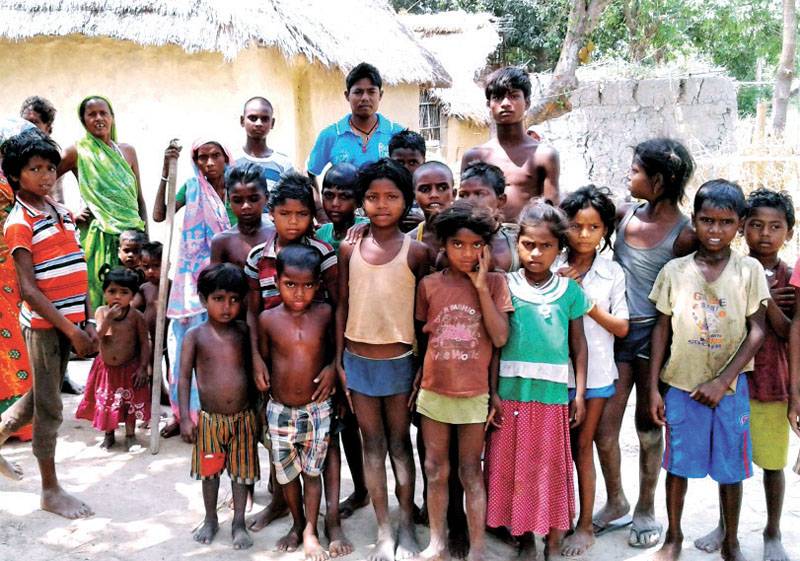Political parties' 'false promises' never change face of Musahar settlement

(Birendra Karna)
Birgunj - Tanu Majhi who lives in the Mushahar settlement at Telkuwa of Gadhimai Municipality-2 in Bara is not much interested about the third phase of local level election taking place in eight districts of the Province No. 2 including Bara on coming September 18.
What is there to motivate the 70-year-old man to take interest in the election. Not only him but also other people from the Musahar (dalit) settlement are not much excited regarding the election as they feel that it has nothing to do with them and it is not their concern. Why should they have concern in the election?
The country celebrated big political changes in the recent decades, but the fate of Telkuwa and its people has remained the same. In every election, it has become customary for political parties/ cadres/supporters/ candidates reaching their doorsteps with 'false promises' of doing something to improve their living conditions, provided that they vote for them and elect them to public positions. But following the election, they never give a second look to the village, said the elder in a complaining voice.
"There is no political leader in the power who has realised the issues of the people here who are becoming poorer day by day," the grandpa shares his personal understanding.
Telkuwa is home to around 160 Musahar households with around 300 eligible voters for the election. When voters of other areas are eagerly to chose their 'right' candidates to operate the local-level, Telkuwa's Musahar people are toiling hard for their landlords to make a living.
Elections are frequent. Political leaders arrived here to woo voters, convinced them to vote for them, but they never made second arrival once they won the election, said another old man Babulal Majhi.
This time, they said who literally seem serious towards their voices for facilitating them to make a better life including the guarantee of basic needs, proper shelter, accessible education and drinking water are getting votes.
They are landless. "We wish to have our own land and live a better life," they are univocal on their demand.
There are only three tube-wells for 80 households who have built houses in public land. These tube-well, the only source to potable water, were built by members of public.
The Mushahar community here seemingly don’t come under radar of the State nor the political parties such as Nepali Congress, CPN-UML and then CPN-Maoist who had made tall promises to the Mushahar community in this locality during the first and the second constituent assembly election but none fulfilled their promises yet, shared voter Ramji Majhi.
A river flows through the Mushahar settlement which lies around two kilometres away from the Bhutahi Bridge in Bariyarpur road section of Kalaiya Bazaar. The flood in the river affected their settlements too as their food items, clothes and utensils were swept away in the flood.
There are other Mushahar settlements that are in Gadhimai Municipality's ward no 2 and 7.
Lorik Majhi, another local, shared that the eligible voters in the community would cast their ballot to those candidates who would pledge to address their basic needs. He affirmed that the voters here would not vote to exercise their franchise but to help elect those fulfilling their commitments and promises.
There were many social organizations that were heftily benefited in the name of ensuring basics to the Mushahar community such as education, drinking water, health and toilets but Mushahars' were still in sorry state, shared human rights activist and media person Shyam Babu Yadav.
Yadav said that the lifestyle of Dalits in these areas were still hard due to the discriminatory attitude of the leaders who were elected by the votes cast by them.
Bharchiya Majhi said that the majority of the Mushahars here work in the landlord's farm land and receive scant rewards, that’s again in kind. They receive five kilo grammes of rice which they sell and buy other essentials from the money it fetches.
Majhi wailed that it was increasingly being difficult for them to rear children and educate them with scant money they make after a hard work's day at other's farmland. According to him, many children in Mushahar settlements were suffering from malnutrition.
The UML has fielded Lorik Majhi and Lalmati Musahar, both from Dalit community, for ward member, while Manjotiya Musahar is vying for the same post from Sanghiya Samajwadi Forum Nepal.
Telling of the predicaments of the Dalit Musahar community, a local media-person Subash Kumar Ram said the community is forced to take out a higher interest loan from their landlords to fulfil their basic needs like purchasing clothes only to fail to pay back, thus further sinking them into debt.
They are also finding it difficult to protect themselves from wind, and rains as their battered houses cannot withstand them. Moreover, the people's housing programme is yet to reach out to them, adding to their woes.
Although approximately 9,000 Musahar families in Bara have applied for being listed on the programme, no progress has been achieved so far to this effect, the community complained.
The programme meant for the poor Musahar community in the district has failed to reach out to the actual group despite spending tens of thousands of rupees, complained an employee of the Urban Development and Building Construction Office.
Lawmakers and various political party leaders have been accused of prioritising their local leaders and cadres on the programme.
The government has released more than Rs 60 million to build 3,000 concrete houses for the poor of Bara, Parsa and Rautahat.
According to the latest Census, Bara has a total of 9639 Musahar families. Anyone visiting the Telkuwa Mushar settlement can easily realise what type of life they are living – a miserable one.
Bara has 16 local levels at its two sub metropolises, five municipalities and 16 rural municipalities. The total number of eligible voters across the district is 334,746.









Leave Comment